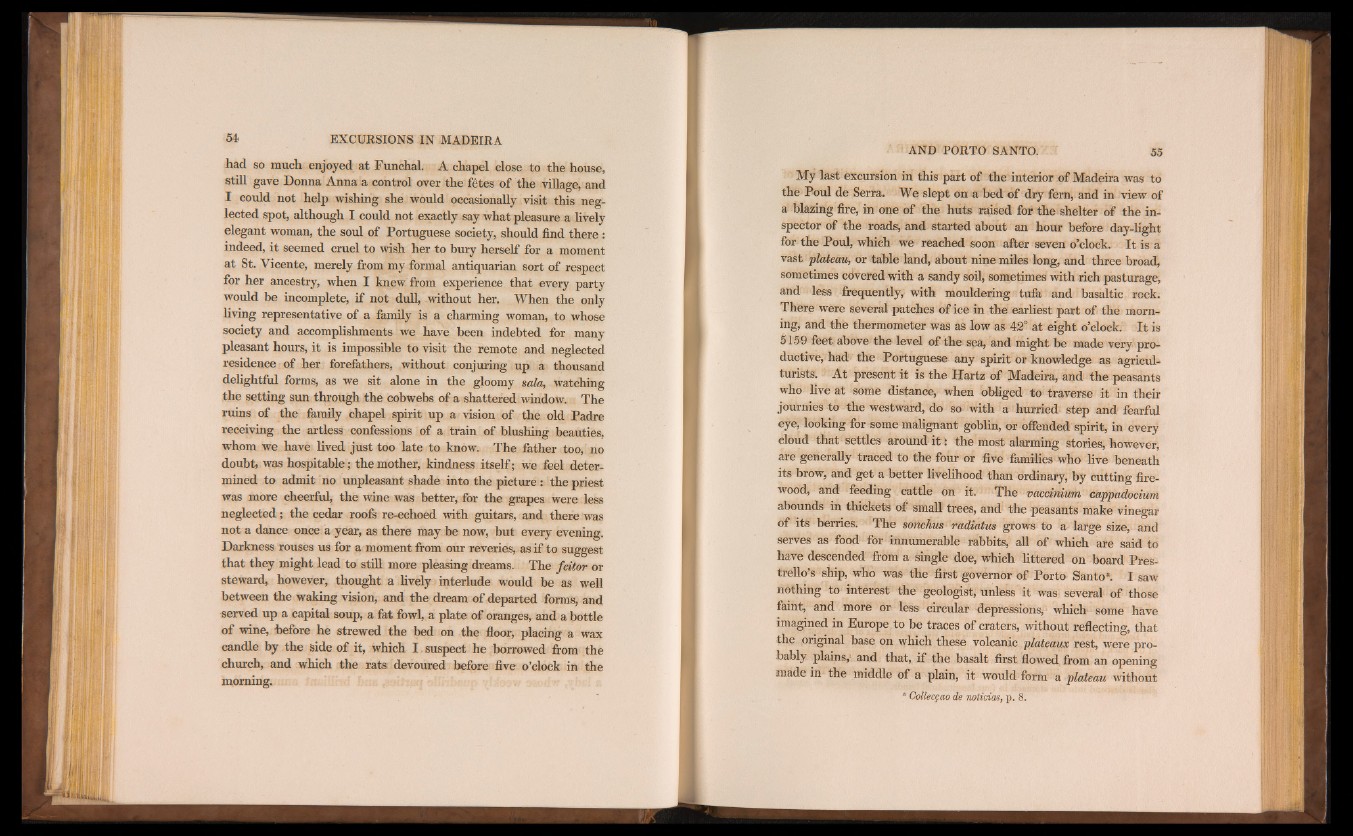
had so much enjoyed at Funchal. A chapel close to the house,
Still gave Donna Anna a control over the fêtes of the village, and
I could not help wishing she would occasionally visit this neglected
spot, although I could not exactly say what pleasure a lively
elegant woman, the soul of Portuguese society, should find there :
indeed, it seemed cruel to wish her to bury herself for a moment
at St. Vicente, merely from my formal antiquarian sort of respect
for her ancestry, when I knew from experience that every party
would be incomplete, if not dull, without her. When the only
living representative of a family is a charming woman, to whose
society and accomplishments we have been indebted for many
pleasant hours, it is impossible to visit the remote and neglected
residence of her forefathers, without conjuring up a thousand
delightful forms, as we sit alone in the gloomy sala, watching
the setting sun through the cobwebs of a shattered window. The
ruins of the family chapel spirit up a vision of the old Padre
receiving the artless confessions of a train of blushing beauties,
whom we have lived just too late to know. The father too, no
doubt, was hospitable; the mother, kindness itself; we feel determined
to admit no unpleasant shade into the picture : the priest
was more cheerful, the wine was better, for the grapes were less
neglected ; the cedar roofs re-echoed with guitars, and there was
not a dance once à year, as there may be now, but every evening.
Darkness rouses us for a moment from our reveries, as if to suggest
that they might lead to still more pleasing dreams. The feitor or
steward, however, thought a lively interlude would be as well
between the waking vision, and the dream of departed forms, and
served up a capital soup, a fat fowl, a plate of oranges, and a bottle
of wine, before he strewed the bed on the floor, placing a wax
candle by the side of it, which I suspect he borrowed from the
church, and which the rats devoured before five o’clock in the
morning.
AND PÒRTO SANTO. 55
My last excursion in this part of the interior of Madeira was to
the Poul de Serra. We slept on a bed of dry fern, and in view of
a blazing fire, in one of the huts raised for the shelter of the inspector
of the roads, and started about an hour before day-light
for the Poul, which we reached soon after seven o’clock. It is a
vast plateau, or table land, about nine miles long, and three broad,
sometimes covered with a sandy soil, sometimes with rich pasturage,
and less frequently,-with mouldering ¡tufa and basaltic rock.
There were several patches of ice in the earliest part of the morning,
and the thermometer was as low as 42° at eight o’clock. It is
5159 feet above the level of the sea, and might be made very productive,
had the Portuguese any spirit or knowledge as agriculturists.
At present it is the Hartz of Madeira, and the peasants
who live at some distance, when obliged to traverse it in their
journies to the westward, do so with a hurried step and fearful
eye, looking for some malignant goblin, or offended spirit, in every
cloud that-settles around-it , the most alarming stories, however,
are generally traced to the four or five families who live beneath
its brow, and get a better livelihood than ordinary, by cutting firewood,
and feeding cattle on it. The vaccinium cappadocium
abounds in thickets of small trees, and the peasants make vinegar
of its berries. The sonchus radiatus grows to a large size, and
serves as food for innumerable rabbits, all of which are said to
have descended from a single doe, which littered on board Pres-
trello’s ship, who was the first governor of Porto Santo“. I saw
nothing to interest the geologist, unless it was several of those
faint, and more or less circular depressions, which some have
imagined in Europe to be traces of craters, without reflecting, that
the original base on which these volcanic plateaux rest, were probably
plains,1 and that, if the basalt first flowed, from an opening
made m the middle of a plain, it would form a plateau without
a Collecgao de noticias, p. 8.